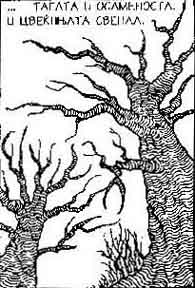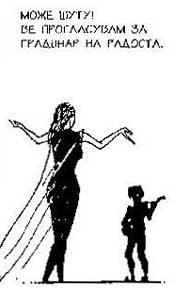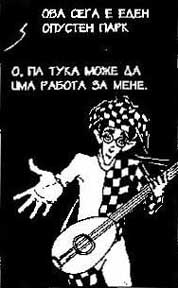T w o I n E d e n ,
C r i t i c s’ E c h o e s . . .
Solitude, the cursed sign
The Skopje premiere of the play “Two in Eden”,
written by Tomislav Osmanli and directed by Dimitrie Osmanli, had been
set in Kumanovo, Macedonia, and Newport News and Richmond in Virginia,
the United States. Although it has been set up in two different hemispheres,
this play confirmed once again that all cultural frontiers can be crossed
over through the emotional echoes of the universal human themes shown
through the simplicity of the theater magic.
 The
city park, an urban metaphor symbolizing the garden of Eden, the biblical
paradise lost because of Adam and Eve’s primal concept of sin, is the ambient
of the dramatic tension through which Toto and Nela exchange the cursed
morsel from the apple of Comprehension. The two characters enunciate
Solitude, an epochal feeling, as the author Tomislav Osmanli asserts.
The Dream, or the “second dimension” of their shallow existence is the
reflection of the emotional values the two characters are incapable of
sharing. The brutal awaking, the reality, is the only thing that separates
them from Eden, their mutual Dream.
The
city park, an urban metaphor symbolizing the garden of Eden, the biblical
paradise lost because of Adam and Eve’s primal concept of sin, is the ambient
of the dramatic tension through which Toto and Nela exchange the cursed
morsel from the apple of Comprehension. The two characters enunciate
Solitude, an epochal feeling, as the author Tomislav Osmanli asserts.
The Dream, or the “second dimension” of their shallow existence is the
reflection of the emotional values the two characters are incapable of
sharing. The brutal awaking, the reality, is the only thing that separates
them from Eden, their mutual Dream.
The solitude, or the unknown, has been very
subtly and dramatically revealed to us through the subtle directing of
Dimitrie Osmanli. The acting expands the horizons of the minimalist
mis-en-scene projecting the emotional variations of the story on the audience…
Victor Shikov
(“Vecher”, May 29, 1998)
A Tale of Loneliness
Everything has an end…just like the fairy
tales, but not the ones with a happy one. The theatrical fairy tale “Two
in Eden” set on the scene of the Theater for Children and Youth has a bitter
end. The play clasps us fiercely into the bitter feeling of loneliness
and leaves everyone feeling alone - especially the puppeteer Nela and her
friend Toto, in the text written by Tomislav Osmanli which is set through
a precise theater metaphor, beautifully expressed in the text, and the
excellent visualization done by director Dimitrie Osmanli. 
The play functions on a level of completeness:
the lyrical text about the human solitude brought to a tragi-comic absurd;
the thoughtful directing which makes us turn towards ourselves with a hope
for today (and maybe tomorrow), the magical scenery of Ljubomir Chadikovski
which is intact with the directing and music, incorporating everything
so perfectly together with the costumes designed by Alexander Noshpal and
the choreography written by Krenare Nevzati-Keri.
In this extremely visual theatrical atmosphere
- a tale of loneliness is narrated.
“Two in Eden” is a play which extorts your
feelings (both joyful and sorrowful) that have to be lived up on the spot:
at the Theater for Children and Youth stage.
Liljana Mazeva
(“Nova Makedonija”, June 7, 1998)
Eden (One) for Two
Tomislav Osmanli is granting us another bright,
small piece: Two In Eden with it’s under-title A Piece For Two,
a Moon and Puppets. It is not unintentionally that the idea of Brightness
is here linked to the one of the Small. Up to now the dramatic and prose
experiences of Tomislav Osmanli instructs us to search the bright things
in the small ones. And again, it is not unintentionally that all the dramatic
texts of Osmanli , no matter if they are TV, movie or theater scripts,
or even short stories as the ones in his book "The Butterfly of Childhood",
have the little man as their main object.

Osmanli’s big little man is actually
his fixed idea, something that occupies his discourse from the beginning
till the end, and that conducts, moderates and structures it. It is again
the same this time, on the example of this very play. In five acts, from
which the four belong to his characters Nela and Toto, and the last to
his (and the character’s) puppets, the Princess and the Jester - in a miniature
and minimal text space, with minimum of existents of the story (characters
and decoration), Osmanli gives a severe lesson to the humanity: he warns
that we can not further on pretend that that we are happy, because we are
lonely. The action takes place in a simple park, that is being transformed
into a metaphor of the Garden of Eden, in which since the Genesis, the
expulsion of Adam and Eve took place….
Venko Andonovski, Ph.D. ,
Literary theoretic, playwright
Inspiring play
…Two in Eden is an inspiring play,
with a skillfully led dialogue, magnificent poetic excerpts full of deep
thoughts. Tomislav Osmanli extremely rationalizes the expression, always
having in mind it’s juices and the dramatic necessities. That is why this
text gets high literary values.
Gligor Stoykovski, poet
Within Life’s Depths
"...Many details make the duo drama Two
in Eden an interesting and entertaining experience to the viewer. First,
this drama is written in a skillful manner and has an excellent word expression.  Second,
the characters of the drama are very well described and well presented.
Third, the author suggests a colorful structure of dialogues. Fourth, Tomislav
Osmanli manages to get rid of the typical scheme and the triviality of
the 'happy-ending story' in the process of creation of his characters and
the establishment of the relationship between them.
Second,
the characters of the drama are very well described and well presented.
Third, the author suggests a colorful structure of dialogues. Fourth, Tomislav
Osmanli manages to get rid of the typical scheme and the triviality of
the 'happy-ending story' in the process of creation of his characters and
the establishment of the relationship between them.
All of the above confirm his knowledge of
the fine drama techniques. Of course, one of the best qualities of this
text is the author's capability of operating through discrete poetic metaphors,
associations and lyrical confessions. This is the reason for the beautiful
poetic atmosphere and background created in this text... Shortly, this
is a well composed and well written text, created with an excellent touch
for theatrical actions..."
Ivan Ivanovski, theater critic
A Universal Look
 "...The
real world and the world of the Puppets coexist together like two dimensions
of the same life. Hence the metaphorical heading of the text is given -
Two in Eden meaning also Two in One in Macedonian language, symbolizing
two worlds in one. Everything is settled somewhere in between the heat
of everyday life and unreality. Everything has its own rhythm, an internal
dynamics which simply entertains the viewer and keeps him interested.
"...The
real world and the world of the Puppets coexist together like two dimensions
of the same life. Hence the metaphorical heading of the text is given -
Two in Eden meaning also Two in One in Macedonian language, symbolizing
two worlds in one. Everything is settled somewhere in between the heat
of everyday life and unreality. Everything has its own rhythm, an internal
dynamics which simply entertains the viewer and keeps him interested.
The viewer's attention is first captured
through the comical dialogues of the Two and then trapped in the spider's
web through the tragic spiritual conditions of the characters. From a bench
in a park the author paints the disturbing ambient of today's age of conflicts
and wars which frustrate mankind in a physical, spiritual and intellectual
way...All this is shaped through an exceptional theatrical text and a directing
free of political theatralizations..."
Mirche Tomovski, journalist and publicist
A lyrical and sentimental
story "
…The innovative dramaturgical proceeding in this text of Osmanli is that he
is actually doubling the characters of Toto and Nela, through the puppets of
the Princess and the Jester. A peculiar and unbelievable conjunction. All of
that introduced elements of a fairytale, besides, of course, its basic values
as for example its lyricism, melodiousness and the similar to that…"
Todor Kuzmanov, theater critic
Indication for the End of the Century
…Same as Olbi in the Zoo Story, the master-piece
of the Absurd theater, Two in Eden are located in the city park, a place
that regarding the Garden of Eden seem so be "fallen" such as the contemporary
man regarding Adam before his expulsion from paradise, or regarding the
cheep woman in comparison with the wife/the fiancee. The city park is,
certainly, a strange place - and tragicomic human try to simulate the divine
act of creating and controlling the Nature, an ironical asylum for all
that do not know weather to escape from loneliness, or toward it. It is
a sarcastic, melodramatic answer to the Garden of Eden and the Noah’s Ark,
and finally, of the graveyard itself where, according to the final words
of the play "everything once ends". (…)
The Biblical and astrologic, fatalistic
connotations of the Two in Paradise make the book contemporary as well
ultra(post)modern.
Vladimir V.Golubovich, media theoretic
Two in Eden: One Act of Love
Getting into the spheres from the other side
of the simple everyday discussion of two unknown, the play tries to express
the whole pathos and tragic of human loneliness and alienation. It is a
performance done upon a text with a deep thinking power that is all and
again pushing us to actively return to it…
As the title itself suggests , the play is
focused on the destiny of two young people, unknown to each other and set
up in a common area. They are characters with different philosophical beliefs
and approaches to what we name happiness, and further more with different
viewing of the way how to rich it. Nela and Toto deliberately resemble
contemporary Eve and Adam, much more of those created in Milton’s Lost
Paradise than of the ones we reveal in the original story from the
Old Testament…
Judy Mercier, critic
The Unknown Archipelago
The text is universal in any concern and
we can easily recognize it’s meaning in each milieu, especially in the
American. It’s original title is a untranslatable play with words. It might
designate "Two in Eden" and in the same time "Two in One", which is a very
amazing paraphrase of Adam and Eve myth. The second rare characteristic of the play is that it is written "for two
actor and two dolls". The puppets’ animation is related to the live actors’
play. In what way?…
The second rare characteristic of the play is that it is written "for two
actor and two dolls". The puppets’ animation is related to the live actors’
play. In what way?…
Instead of the Apple-tree of comprehension,
Nela as a puppeteer gives Toto in first place his, and later her own puppet.
The two living puppets decide, by giving live to the un-living ones, to
run away into that prehistoric image of life, from the terrible silence
and solitude, into the reality of the story, into the tale very similar
to Oscar Wilde’s The Nightingale and the Rose… What the puppet-people
are not in a position to carry through, the puppets themselves are able
to achieve. They can release the tragic catharsis: only the love expressed
by the ancient self-victimization, can return the life to this world in
all it’s effloresce.
Dalibor Foretich, theatrologist
 The
city park, an urban metaphor symbolizing the garden of Eden, the biblical
paradise lost because of Adam and Eve’s primal concept of sin, is the ambient
of the dramatic tension through which Toto and Nela exchange the cursed
morsel from the apple of Comprehension. The two characters enunciate
Solitude, an epochal feeling, as the author Tomislav Osmanli asserts.
The Dream, or the “second dimension” of their shallow existence is the
reflection of the emotional values the two characters are incapable of
sharing. The brutal awaking, the reality, is the only thing that separates
them from Eden, their mutual Dream.
The
city park, an urban metaphor symbolizing the garden of Eden, the biblical
paradise lost because of Adam and Eve’s primal concept of sin, is the ambient
of the dramatic tension through which Toto and Nela exchange the cursed
morsel from the apple of Comprehension. The two characters enunciate
Solitude, an epochal feeling, as the author Tomislav Osmanli asserts.
The Dream, or the “second dimension” of their shallow existence is the
reflection of the emotional values the two characters are incapable of
sharing. The brutal awaking, the reality, is the only thing that separates
them from Eden, their mutual Dream.


 Second,
the characters of the drama are very well described and well presented.
Third, the author suggests a colorful structure of dialogues. Fourth, Tomislav
Osmanli manages to get rid of the typical scheme and the triviality of
the 'happy-ending story' in the process of creation of his characters and
the establishment of the relationship between them.
Second,
the characters of the drama are very well described and well presented.
Third, the author suggests a colorful structure of dialogues. Fourth, Tomislav
Osmanli manages to get rid of the typical scheme and the triviality of
the 'happy-ending story' in the process of creation of his characters and
the establishment of the relationship between them.
 "...The
real world and the world of the Puppets coexist together like two dimensions
of the same life. Hence the metaphorical heading of the text is given -
Two in Eden meaning also Two in One in Macedonian language, symbolizing
two worlds in one. Everything is settled somewhere in between the heat
of everyday life and unreality. Everything has its own rhythm, an internal
dynamics which simply entertains the viewer and keeps him interested.
"...The
real world and the world of the Puppets coexist together like two dimensions
of the same life. Hence the metaphorical heading of the text is given -
Two in Eden meaning also Two in One in Macedonian language, symbolizing
two worlds in one. Everything is settled somewhere in between the heat
of everyday life and unreality. Everything has its own rhythm, an internal
dynamics which simply entertains the viewer and keeps him interested.
 The second rare characteristic of the play is that it is written "for two
actor and two dolls". The puppets’ animation is related to the live actors’
play. In what way?…
The second rare characteristic of the play is that it is written "for two
actor and two dolls". The puppets’ animation is related to the live actors’
play. In what way?…